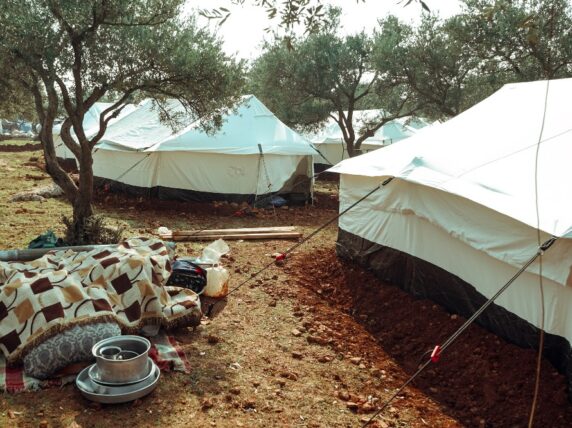Escalating conflict in Sudan: what do we know?
British nationals are in the process of being evacuated from Sudan while a 72-hour ceasefire is in place between the Sudanese Armed Forces (SAF) and the paramilitary group Rapid Support Forces (RSF).
At the time of writing, the death toll has reached over 400 people, including 5 humanitarian workers, and 3,551 have been injured. Food and water supplies are running low, key infrastructure providing clean water has been destroyed and hospitals are quickly running out of supplies.
The UN has stated that they are preparing for up to 270,000 people fleeing Sudan to arrive in South Sudan and Chad. UNHCR have stated the most pressing needs are water, food, shelter, health care, child protection, and prevention of gender-based violence.
Sudan was already in a humanitarian crisis. 15.8 million people – around a third of the population – were already in need of humanitarian assistance. Climate change has been causing flooding and drought, there has been constant social and political unrest and rising food prices are causing hunger and displacement.
Sudanese civil society networks and local communities are responding to the needs of their communities by providing medical support, sharing food and water and supporting each other.
Due to heavy fighting in parts of the country, some INGO staff are having to take shelter but will resume their work when it is safe for them to do so.
How is the Foreign, Commonwealth & Development Office responding to the situation?
The UK government has commenced an evacuation effort to help British nationals leave Sudan and has advised all British nationals in Sudan to register their presence with the FCDO. In an update to the House of Commons, Minister for International Development and Africa, Andrew Mitchell highlighted the likelihood of the humanitarian need increasing significantly considering the violence and stated that alongside helping British nationals evacuate, the priority is to end the violence to guarantee the safety of British nationals and everyone in Sudan.
At the UN Security Council meeting on Sudan, UK Ambassador Woodward called on both sides to allow humanitarian access, comply with their obligations under international humanitarian law, and ensure the protection of civilians, humanitarian and medical workers.
What are INGOs and their colleagues in Sudan saying?
Karl Schembri, the regional media adviser for the Norwegian Refugee Council (NRC) has told Al Jazeera that there are many “Sudanese local organisations and activists doing their own brave work on the ground, which many of us couldn’t do”. His group, he said, is “still at a standstill when delivering aid, but depending on the security assessments, we are hoping to start delivering to the thousands who have been displaced from this week.”
Aleksandra Roulet-Cimpric, the International Rescue Committee (IRC) Chad Country Director, said:
“Following intense internal conflict in Sudan, up to 15,000 people have been estimated to have arrived over the border from Sudan into Chad since last weekend. We are seeing that the refugees arriving over the border are traumatized and are arriving with very little provisions. There are relief organizations that are providing support to new arrivals and as of now, the greatest need is for health services as well as water, sanitation, hygiene and protection services, particularly for women and girls.
“In the coming days, IRC will respond to critical needs of water with water trucking services and we will continue preparation to respond to health, nutrition, sanitation and protection needs of the incoming population from Sudan”
Akinyi Walender, Africa director at Practical Action, said:
“The internet blackout will make this difficult and they will feel even more isolated. I am extremely concerned about them all. I was in Sudan just three weeks ago and I know how committed our staff are to helping people in the country adapt to the climate crisis, the consequences of which are currently being played out across of the Sahel region.
“The current crisis underlines why our work in Sudan is vital. Not only must we react to the effects of the current crisis, we must also remain committed to dealing with the long-term root causes of it.”
James Wani, Christian Aid South Sudan Country Director, said:
“South Sudan is already facing a severe food emergency. There is a significant shortfall in humanitarian funding. If this conflict in Sudan doesn’t stop soon, and refugees start crossing the border in large numbers, then this will exacerbate an existing humanitarian crisis.
“Christian Aid is calling on the South Sudanese government not to diverge from its commitment to implementing both the peace agreement and formation of the government of national unity which requires citizen engagement.”
Arshad Malik, Country Director for Save the Children in Sudan, said:
“The country’s already depleted health system has been plunged into chaos and children, particularly those living with malnutrition or other health conditions, will be the first victims. Not only do we need to see this ceasefire last indefinitely – we need to make something of it by providing healthcare, food and water for children who have endured days of terror. We need the international community to do what it can to help authorities rebuild our health system and provide funding for the country’s hunger and healthcare crisis.”
Elsadig Elnour, Islamic Relief’s Country Director in Sudan, said:
“Hospitals need urgent support. Most hospitals in Khartoum are no longer functioning and several hospitals have been bombed and shot at. Others have run out of fuel and cannot function. Those still open are crowded with injured people and running out of medicine and supplies. They don’t even have enough bandages.
“Lots of injured people can’t even reach hospital as the streets are too dangerous as the fighting spreads into more residential areas. We urgently need the parties to the conflict to agree safe routes to evacuate injured people and enable aid agencies to support people.”
David Eastman, International Medical Corps’ Senior Director of International Programs, said:
“International Medical Corps is extremely concerned with the deteriorating situation. Large segments of the population are cut off from services, supply chains are disrupted, damage to critical infrastructure is growing every day, frontline health facilities are strained and overburdened due to mass casualties, and health facilities are running out of supplies and personnel. In response to the situation, International Medical Corps is rolling out a multi-pronged strategy to act immediately and save lives.”
Stephanie Draper, Chief Executive of Bond said:
“We are concerned by the ongoing conflict in Sudan and the effect this is having on the civil population.
“We have heard from some of our members on the ground that humanitarian workers are sheltering and will attempt to resume their work only when it is safe for them to do so.
“The safety and security of the civil population and humanitarian workers remains our foremost concern. We urge the UK government to deploy all the humanitarian and diplomatic levers at their disposal to support all the Sudanese people who are in need when it is safe to do so.”
Please refer to Relief Web for the latest updates.
Category
News & Views



